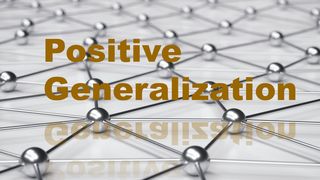Relationships
Who Are You? Reasoning from the Particular to the General
Too often, we let negative interactions define people—including ourselves.
Posted August 15, 2019
You know how it goes. You go into a department store and have an unpleasant encounter with the person at checkout…..and you never go back there again. The particular incident has given you a bad feeling for the entire organization.
You break up with a boyfriend or girlfriend and, at least for a while, you think that no one really can be trusted. This one relationship makes you mistrustful of such relationships in general.
Generalization. It can help us when the generalization is true, or it can distort reality for us when false. For example, when we touch poison ivy in one wood, it is wise to avoid it in the next—and the next. The effects of poison ivy generalize regardless of which plant we touch. On the other hand, one boyfriend’s bad behavior does not predict another person’s behavior. In this case, generalization closes down our mind and heart when there is no need for this.

When you are hurt by someone, you have to be careful not to generalize this to many, most, or all others. Not everyone is out to hurt you. Such generalization can form the unhealthy foundation for a world view that is pessimistic and inaccurate. Has this happened to you?
If so, it is time to fight back against this. Try saying the following to yourself as a way to break the habit of a false view of others:
I have been wounded by another person. For today, I will not let his/her wounds make me a bitter person who thinks negatively about people in general. I will overcome any tendency toward this by seeing others as having special worth, not because of what they have done, but in spite of this. We are all on this planet together; we are all wounded. Not all are out to wound me.

And while we are at it, may we examine how you might have generalized about your own self-worth as you have been treated unfairly by others, or have let yourself down? The tape in your mind about who you are needs to be challenged if you make such generalized statements as this: I am not much as a person; I am less than others; I deserve what I get.
I challenge you to stop playing that tape and practice this instead: I am a person of worth and I will not believe the lie that others throw my way. I will resist the tendency to think of myself as less than I am. I am someone who can love and can be loved. In this case, you again are reasoning from the particular to the general, but now the general is about you as a loving person.....and such a generalized perspective may make all the difference in your beginning to grow in happiness.


